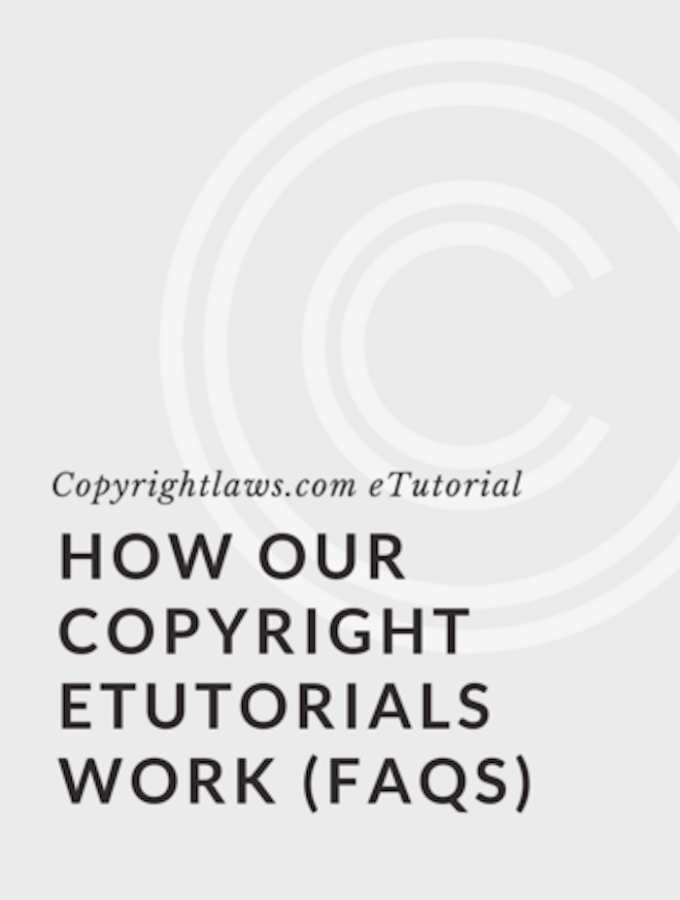Do you have questions about copyright ownership and duration? Our brief and clear answers to these commonly asked questions will help.
As always, please don't rely on our short, practical answers as legal advice or opinions. Contact an attorney should you be faced with copyright ownership and duration issues.
Copyright Ownership
Who owns the copyright to the text, illustrations and photographs in a published book?
There's no straightforward answer. Ownership depends upon the publishing agreement signed by the publisher and author, illustrator or photographer. If you want to reproduce a portion of a book, it's often easiest to locate and contact the publisher. If the publisher can't provide you with reproduction rights, they can refer you to the author, illustrator or photographer, or their representative, who may provide you with the appropriate rights.
Do I own the copyright to photographs taken during an expedition that was funded by a separate entity (i.e., a museum)? I used my own photographic equipment and I didn't sign any document that transfers my copyright.
Subject to specific exceptions, a person owns the copyright in photographs they take. Although you didn't sign any assignment of copyright, you need to check the wording in your funding agreement to see if you've transferred your rights in exchange for being funded for your project.
Who owns copyright in U.S. government works?
If the work in question was created by a federal government employee in the course of their job duties, the work is in the public domain, meaning there's no copyright protection in it. However, the U.S. government may own copyright in some works; for instance, if they were bequeathed or assigned to them. For example, a U.S. government contractor might write a report and then assign copyright to the government, resulting in the government owning copyright in it. Outside the U.S., the protection of U.S. government works is dependent upon the laws of the country where the work is used. (You may be interested in our article Copyright in U.S. Government Works.)
A visitor loaned our museum library some slides for us to digitize. Who owns the copyright in the slides?
A loan doesn't constitute a transfer of rights. The visitor presumably owns the copyright in the slides, unless they transfer ownership to you in a signed agreement. Before digitizing the slides, ensure that the visitor does in fact own the copyright in the slides and doesn't just own the physical slides.
What should you do if a publisher tells you that rights in a book have reverted to the author, but the author claims otherwise?
Ask the publisher to send you an email confirming that rights have reverted to the author. You may then need to “educate” the author so they understand they have the rights and may grant permission for your use.
To complement a work project, my employer posted some of my personal photos on the company’s website. May my employer do this without my permission?
No, the copyright in the photographs belong to you, unless the photographs were taken as part of your employment duties. Your employer must get your permission prior to posting them.
If you're Canadian you may be interested in our article Who Owns Copyright in Canada?
Copyright Duration
Do copyrights have expirations? I've heard they run out in 17 years. I have a copyright from 1981 on some artwork. Is it still valid?
Copyright does have a limited duration. For example, copyright expires 70 years after an author’s death in the U.S. The duration may vary for different works and situations, and also in different countries. Look at the copyright office in your country to determine what applies in your situation. The United States Copyright Office offers two circulars dealing with copyright duration:
Is there a general rule for copyright duration in the U.S.?
Under the general rule of duration, the copyright term is determined by the life of the author, not that of the copyright owner. Copyright endures for 70 years after an author’s death, until the calendar year end. This is the life-plus-seventy rule. If an author died on 1 February 1980, copyright in their work expires on 31 December 2050 and it falls into the public domain on 1 January 2051. This rule applies to a work in some fixed form on or after 1 January 1978.
Is there a simple way to determine duration of a copyright work in the U.S.?
The duration of copyright protection in the U.S. is more complicated than in other countries. This is due in part to numerous amendments to copyright duration in the U.S. You can find a helpful chart to determine whether a work is in the public domain at:
What does public domain mean?
Public domain means that a work isn't protected by copyright. This may occur in several situations. For example, U.S. government works (those created by the U.S. government and its employees) are in the public domain. Also, works in which copyright duration has expired are in the public domain. (For more information, see What Is the Public Domain?)
My organization wants to copy and paste a photo from another website onto our own. The photo has no copyright notice, nor any information relating to copyright protection, or the name of the photographer or owner. Is the work in the public domain?
No, assume that all content online is protected by copyright unless there's a statement to the opposite, or you've investigated the copyright status of the work. Even a work that doesn't contain a copyright symbol or other information relating to the identification of the copyright owner is presumably subject to copyright protection.
Do all countries have the same copyright duration?
No. The Berne Convention sets out the minimum duration for copyright protection, which is currently life-plus-fifty, meaning 50 years after the author's death. So most countries still have a life-plus-fifty duration. However, countries are free to provide a longer duration. The U.S. and European Union countries now provide a life-plus-seventy duration. Note that this is the general rule of copyright duration and specific works such as government works and employment works may have different durations of protection.
John Doe, a staff newspaper photographer, took a photograph as part of his employment. Doe died in 1963. Is the newspaper’s copyright in the photograph still valid in 2018, or did it expire in 2013, 50 years after Doe died?
It depends on which country you're in. For example, in Canada, the duration of an employment work is based upon the life of the author, not the employer. In the U.S., the duration of copyright for an employment work is 95 years from the date of publication or 120 years from the date of creation, whichever expires first.
How would I determine copyright duration for a work that two people authored?
Such a work is called a "joint work." Where two or more authors prepared a work, the duration of protection is 70 years after the last surviving author’s death. For example, if two writers partner on a screenplay and one predeceases the other, copyright in the screenplay lasts 70 years after the surviving author’s death (until 31 December of that year).
Do moral rights have the same duration as the economic rights of copyright?
This varies by country. In the U.S., inder the Visual Artists Rights Act (VARA), artists who create works of visual art such as paintings, drawings and photographs in a single copy or limited editions of 200 or fewer signed and numbered copies have the right of attribution (one of several moral rights). The duration of protection of this right is the life of the author, whereas economic rights endure for 70 years after the death of the author.
In some countries, moral rights have the same duration as copyright (e.g., Canada) and in others, such as France, moral rights last in perpetuity.
To learn more about copyright law, see our calendar of online copyright courses.



